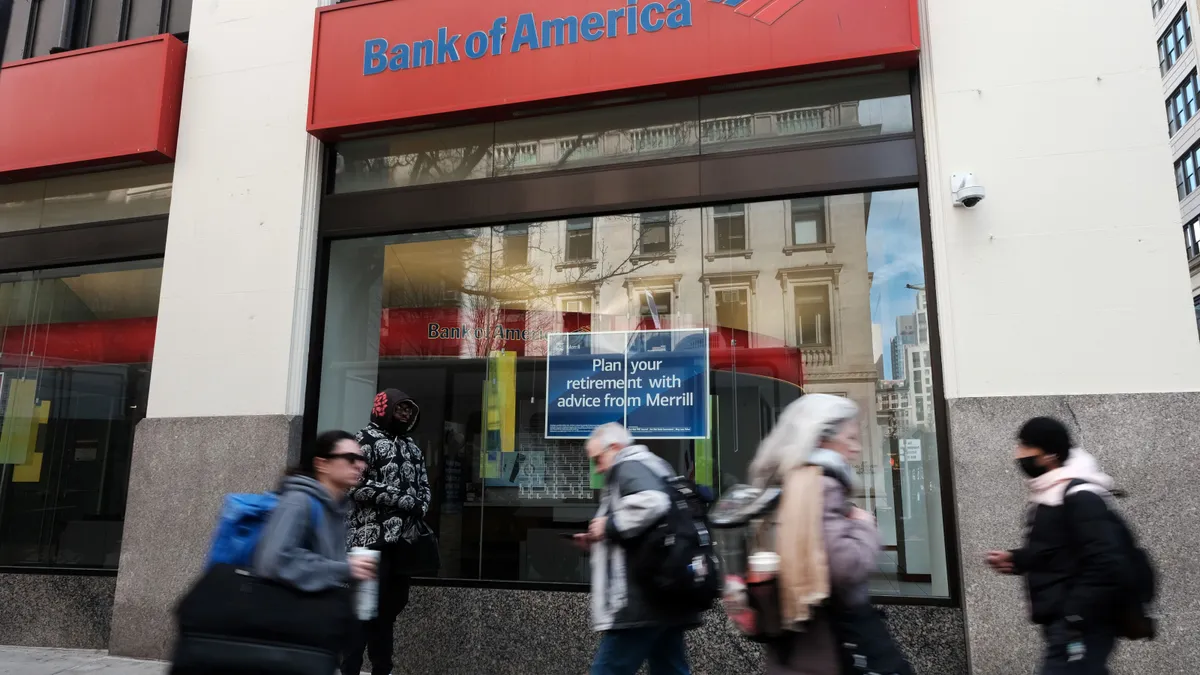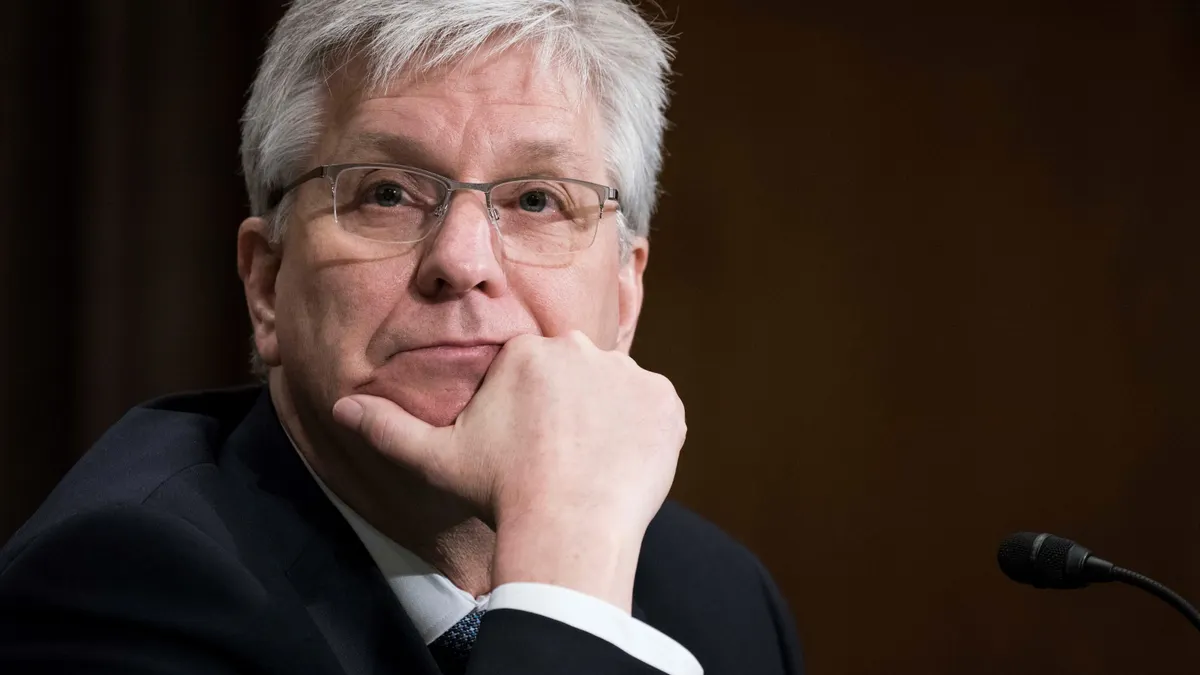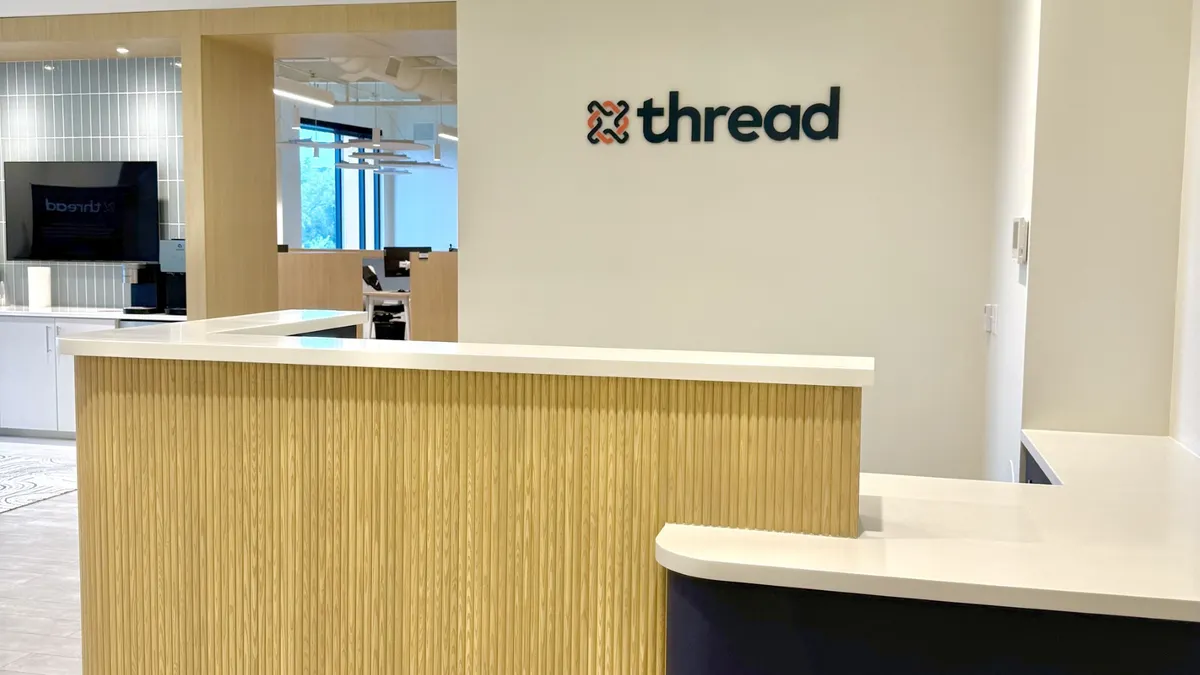Circle Internet Group’s CFO Jeremy Fox-Geen touted the company’s initial public offering Thursday as a historic milestone not just for the stablecoin issuer itself, but for the foundation of a “new internet financial system,” he said on the day of the offering. Circle priced its initial public offering at $31 per share, giving it a total value of approximately $6.8 billion.
“There's a great symbolism here,” Fox-Geen told CFO Dive in an exclusive interview. “We're at the heart of the traditional financial system, literally right now, on the floor of the New York Stock Exchange. But what we're doing is, along with others, the hard work of building a new internet financial system.”
Taking a victory lap after the New York City-based company, which issues the stablecoin USDC, officially began trading under the ticker CRCL on the New York Stock Exchange on Thursday, Fox-Geen in a LinkedIn post praised the company’s achievements and its place at the “heart” of that new system — “one that reduces costs and friction for everyone,” he wrote. “One that unlocks entirely new forms of utility, access, and innovation.”
The road to the NYSE
The IPO is the achievement of a longtime goal for Circle, which has tried for years to make the transition to a public entity. The public offering follows an aborted attempt to go public via special-purpose acquisition merger in 2022, when the stablecoin issuer mutually terminated an agreement with blank-check company Concord Acquisition Corp. after the deal timed out. However, Fox-Geen told CFO Dive at the time, the company then promptly began exploring alternative ways to make its public debut.
For the stablecoin issuer, the long-awaited public offering represents an “accelerant” for its plans as a global business, Fox-Geen told CFO Dive on Thursday.
“We have customers and users all around the world, and we'll be just building on that position to build more distribution partnerships and attract more users around the world,” he said of the company’s plans following its IPO.
In the four years since Fox-Geen, a McKinsey and PricewaterhouseCoopers alum, took Circle’s CFO seat, the company has reported steady growth in the face of various challenges to the cryptocurrency space, including the 2023 collapse of Silicon Valley Bank, dips in the circulation of its USDC stablecoin, and other headwinds, the company said in a prospectus filed May 27 with the Securities and Exchange Commission ahead of its offering.
The company expanded its full-year revenue from $15.4 million in 2020 to $1.7 billion in revenue and reserve income for full-year 2024, according to the filing. For 2024, Circle also reported net income of $155.7 million, according to the filing.
The company’s headcount has also swelled over that time, with Circle hiring additional talent and expertise as it moved to prepare for its IPO and ensure it was operating under public company standards, Fox-Geen said.
“Circle has been audited for many, many years, but for the last four years … we have been running ourselves to public company standards, and we had the practice of doing that to get make sure that we're ready from a financial control perspective,” he said.
Transparency and trust
Circle’s IPO also comes at a time when the cryptocurrency space — and most notably, stablecoins — has increasingly drawn more mainstream support and as the Trump administration takes steps to cultivate a friendlier relationship with businesses in the industry. That includes appointing crypto-friendly leaders to head agencies such as the SEC and setting up working groups to examine the potential use cases of stablecoins.
With its IPO, Circle is “holding ourselves to the very highest of standards for oversight, for transparency and for trust,” Fox-Geen said.
The company has long cultivated strong relationships with regulators, and has since its founding, “always believed that money is a regulated business,” he said. “All governments and regulators believe that, so perhaps it's a statement of the obvious, and we've always sought to do things the right way.”
Others in the industry have echoed Fox-Geen’s calls for greater transparency and clearer regulatory standards within the space. Regulatory clarity is “foundational” for crypto, Dan Chen, the newly minted CFO of Gemini Trust — the cryptocurrency exchange founded by Tyler and Cameron Winklevoss — said in a recent interview.
The call for regulatory clarity comes as numerous global governments, as well as businesses, have taken second looks at the potential use cases of stablecoins — cryptocurrencies backed by a fiat asset, such as the U.S. dollar.
The Senate, for example, recently passed the GENIUS Act, a bill that would establish a regulatory framework for stablecoins, NBC reported. The European Union, meanwhile, issued approval in February for 10 firms to issue stablecoins within the region, a list which includes Circle, according to CoinTelegraph. Circle’s USDC, which is backed one to one with the U.S. dollar, has a current market cap of roughly $61.4 billion, according to CoinMarketCap.
“We’re heartened that around the world, regulators are converging on a consensus for how to manage a well-run stablecoin, and that consensus is largely the way that circle does business,” Fox-Geen said.
The moves by lawmakers to cultivate friendlier relationships with the space come as Circle is also seeing “strong growth” in potential use cases for stablecoins, which are expanding outside of the digital asset market — their “bootstrap use case,” Fox-Geen said.
“We're seeing strong growth in cross-border payments, particularly among small and medium-sized enterprises, and we're seeing the green shoots of utility and growth in many other money movement use cases,” he said.






















